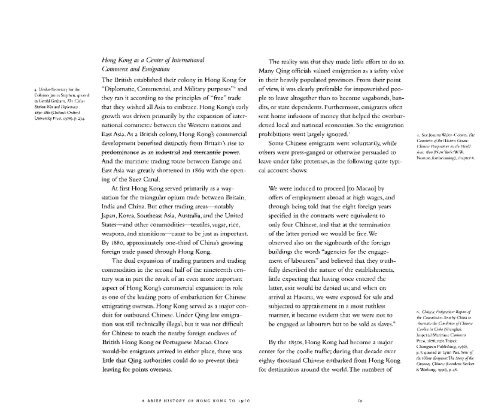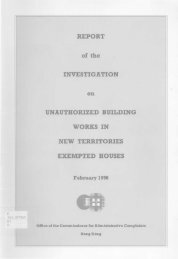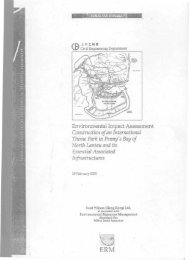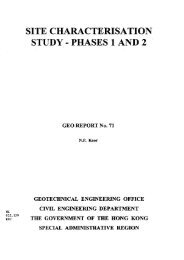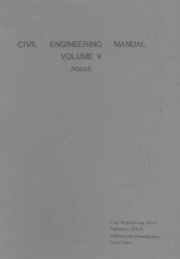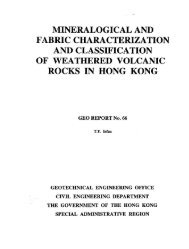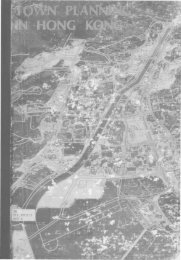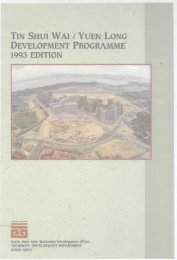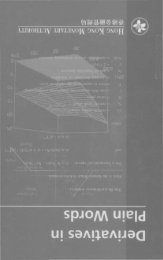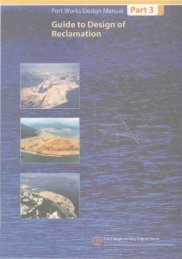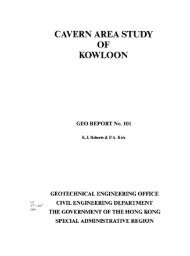picturing hong kong - HKU Libraries
picturing hong kong - HKU Libraries
picturing hong kong - HKU Libraries
You also want an ePaper? Increase the reach of your titles
YUMPU automatically turns print PDFs into web optimized ePapers that Google loves.
4. Under-Secretary for the<br />
Colonies James Stephen, quoted<br />
in Gerald Graham, The China<br />
Station: War and Diplomacy<br />
1830-1860 (Oxford: Oxford<br />
University Press, 1978)4-). 234.<br />
Hong Kong as a Center oj International<br />
Commerce and Emigration<br />
The British established their colony in Hong Kong for<br />
"Diplomatic, Commercial, and Military purposes" 4 and<br />
they ran it according to the principles of "free" trade<br />
that they wished all Asia to embrace. Hong Kong's early<br />
growth was driven primarily by the expansion of international<br />
commerce between the Western nations and<br />
East Asia. As a British colony, Hong Kong's commercial<br />
development benefited distinctly from Britain's rise to<br />
predominance as- an- industrial an-d mercantile power.<br />
And the maritime trading route between Europe and<br />
East Asia was greatly shortened in 1869 with the opening<br />
of the Suez Canal.<br />
At first Hong Kong served primarily as a waystation<br />
for the triangular opium trade between Britain,<br />
India and China. But other trading areas—notably<br />
Japan, Korea, Southeast Asia, Australia, and the United<br />
States—and other commodities—textiles, sugar, rice,<br />
weapons, and munitions—came to be just as important.<br />
By 1880, approximately one-third of China's growing<br />
foreign trade passed through Hong Kong.<br />
The dual expansion of trading partners and trading<br />
commodities in the second half of the nineteenth century<br />
was in part the result of an even more important<br />
aspect of Hong Kong's commercial expansion: its role<br />
as one of the leading ports of embarkation for Chinese<br />
emigrating overseas. Hong Kong served as a major conduit<br />
for outbound Chinese. Under Qing law emigration<br />
was still technically illegal, but it was not difficult<br />
for Chinese to reach the nearby foreign enclaves of<br />
British Hong Kong or Portuguese Macao. Once<br />
would-be emigrants arrived in either place, there was<br />
little that Qing authorities could do to prevent their<br />
leaving for points overseas.<br />
A BRIEF HISTORY OF HONG KONG TO I 9 I 0<br />
The reality was that they made little effort to do so.<br />
Many Qing officials valued emigration as a safety valve<br />
in their heavily populated provinces. From their point<br />
of view, it was clearly preferable for impoverished people<br />
to leave altogether than to become vagabonds, bandits,<br />
or state dependents. Furthermore, emigrants often<br />
sent home infusions of money that helped the overburdened<br />
local and national economies. So the emigration<br />
prohibitions went largely ignored. 5<br />
Some Chinese emigrants went voluntarily, while<br />
others were press-ganged or otherwise persuaded to<br />
leave under false pretenses, as the following quite typical<br />
account shows:<br />
We were induced to proceed [to Macao] by<br />
offers of employment abroad at high wages, and<br />
through being told that the eight foreign years<br />
specified in the contracts were equivalent to<br />
only four Chinese, and that at the termination<br />
of the latter period we would be free. We<br />
observed also on the signboards of the foreign<br />
buildings the words "agencies for the engagement<br />
of labourers" and believed that they truthfully<br />
described the nature of the establishments,<br />
little expecting that having once entered the<br />
latter, exit would be denied us; and when on<br />
arrival at Havana, we were exposed for sale and<br />
subjected to appraisement in a most ruthless<br />
manner, it became evident that we were not to<br />
be engaged as labourers but to be sold as slaves. 6<br />
By the 18505, Hong Kong had become a major<br />
center for the coolie traffic; during that decade over<br />
eighty thousand Chinese embarked from Hong Kong<br />
for destinations around the wo rid. The numbers of<br />
6. Chinese Emigration: Report of<br />
the Commission Sent by China to<br />
Ascertain the Condition of Chinese<br />
Coolies in Cuba (Shanghai:<br />
Imperial Maritime Customs<br />
Press, 1876; repr.Taipei:<br />
Chengwen Publishing, 1970),<br />
p. 7, quoted in Lynn Pan, Sons of<br />
the Yellow Emperor:Tlie Story of the<br />
Overseas Chinese (London: Seeker<br />
& Warburg, 1990), p. 48.


